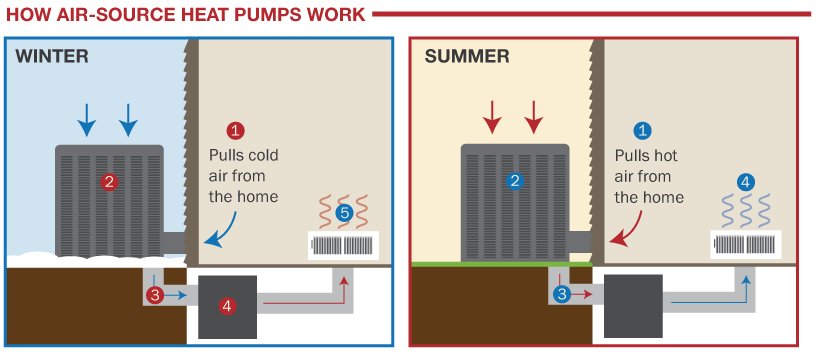
March 16, 2023
Why are heat pumps so popular?
Because they have various advantages over more conventional heating and cooling systems, heat pumps are a common and popular choice for heating and cooling residential properties. These benefits include reduced monthly energy costs, friendliness toward the environment, adaptability, and growing political support.
Heat pumps’ ability to drastically cut homeowners’ energy expenses is one of the key reasons for their widespread use in residential settings. Heat pumps are more successful at heating homes since they do not generate heat but rather use electricity to transport heat around, making them more efficient than traditional heating methods. Heat pumps, on the other hand, do not require the combustion of fossil fuels in order to generate heat, therefore they tend to be less expensive and more environmentally friendly over the long run.
The environmental friendliness of heat pumps in comparison to that of conventional heating and cooling systems is one further reason for the rise in popularity of heat pumps. Heat pumps, in comparison to other types of home heating systems, are responsible for a lower emission of greenhouse gases, making them an excellent option for families who are interested in lowering their overall carbon footprint. In addition, heat pumps are being recognized in an increasing number of nations as a vital tool for the decarbonization of the heating industry. As a result, heat pumps have the potential to play a significant part in the battle against climate change by lowering the amount of carbon emissions produced by the residential sector.
Homeowners can find answers to their heating and cooling needs with the help of heat pumps, which are extremely adaptable appliances. The operation of a heating, ventilation, and air conditioning (HVAC) system can be made more straightforward and convenient for homeowners by utilizing this all-in-one solution.
Last but not least, heat pumps are gaining an increasing amount of attention from policymakers. In an effort to lower their levels of carbon emissions, a number of nations throughout the world are enacting regulations that favour the use of heat pumps in the construction industry. For example, the Clean Heat Grant in the United Kingdom will pay up to $8,000 toward the cost of installing renewable heating systems in residential properties. These systems may include air source heat pumps (ASHPs). In addition, the new climate strategy adopted by the EU intends to reduce the amount of carbon dioxide emissions produced by cities and heating systems through the use of heat pumps and other renewable energy sources. The popularity of heat pumps is being driven even further by the growing support they are receiving from policymakers.
In conclusion, heat pumps are becoming increasingly popular for a variety of reasons, some of which were mentioned above. These reasons include decreased energy bills, kindness to the environment, adaptability, and growing regulatory backing. When compared to other types of heating and cooling systems, heat pumps, on the other hand, are widely considered to be the most effective option for households.
← Back to our Blog
